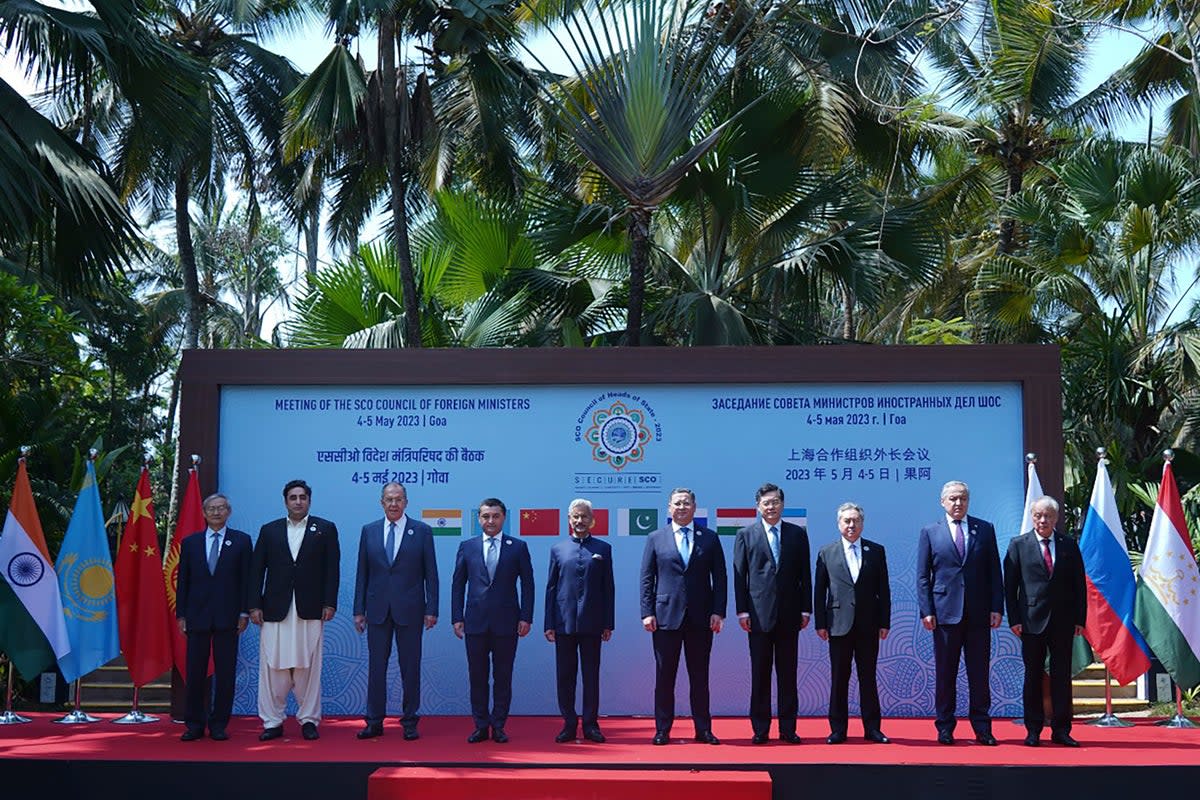Pakistan’s Bilawal Bhutto Zardari warns against ‘diplomatic point scoring’ during historic India visit
Pakistan’s foreign minister has warned against “diplomatic point scoring” on the issue of terrorism while on a historic visit to rival India – the first by an official from the country in 12 years.
Bilawal Bhutto Zardari landed in India’s tourist state Goa on Thursday to lead a delegation to a Shanghai Cooperation Organisation (SCO) summit being chaired by India.
Mr Bhutto Zardari’s visit comes at a crucial time as ties between the two neighbours remain strained over a series of long-standing disputes as well as recent jibes he made that targeted Indian leadership.
The Pakistani diplomat is the first to visit India since 2011, when ex-foreign minister Hina Rabbani Khar had set foot on Indian soil.
Mr Bhutto Zardari’s comments came on the heels of India raising the issue of cross-border terrorism soon after he was received at the SCO conference on Friday by his Indian counterpart.
“The collective security of our peoples is our joint responsibility. Terrorism continues to threaten global security,” Mr Zardari said on Friday, at the SCO conference.
“Let’s not get caught up in weaponising terrorism for diplomatic point scoring.”
His comments came as the host nation’s foreign minister S Jaishankar raised the issue of cross-border terrorism in an apparent reference to Islamabad.
“While the world was engaged in facing Covid and its consequences, the menace of terrorism continues unabated,” Mr Jaishankar said.
“Taking our eyes off this menace would be detrimental to our security interests. We firmly believe that there can be no justification for terrorism and it must be stopped in all its forms and manifestations, including cross-border terrorism.”
In a world facing geo-political flux, dividing the world between us and them – the SCO has emerged as a platform for promoting mutual understanding – FM @BBhuttoZardari at the SCO Council of Foreign Ministers#PakatSCO
1/2 pic.twitter.com/D2SMcXq8eG— PPP (@MediaCellPPP) May 5, 2023
India has long accused Pakistan of funding terror in the Indian-administered side of the Jammu and Kashmir by arming and training insurgent groups either fighting for independence in the region or for its integration into Pakistan – a charge Islamabad has consistently denied.
Mr Jaishankar said channels that fund terror activities must be seized and blocked without distinction.
During his address, Mr Zardari responded by calling the eradication of terrorism a “joint responsibility” and said Pakistani people have “suffered the most” from the issue.
The Pakistani foreign minister, whose mother and former Pakistan prime minister Benazir Bhutto, was assassinated in 2007, said he spoke as the son whose mother was killed by terrorists.
FM @BhuttoZardari urged to collectively eradicate the menace of terrorism
💬" Let’s not get caught up in weaponising terrorism for diplomatic point scoring"#PakFMatSCO pic.twitter.com/H5awOoQDF5— Spokesperson 🇵🇰 MoFA (@ForeignOfficePk) May 5, 2023
“I feel the pain of this loss, empathise with victims across the world in a way most can’t. I, and my country, are firmly committed to be part of regional and global efforts for eradicating this menace,” he said.
Earlier while boarding the plane for his two-day India visit, Mr Zardari emphasised that his tour will be “focused exclusively on SCO” and avoided any mention of India.
The senior Pakistani official’s visit has garnered much attention in the media and among people on both sides of the border as several expected it to be a sign of reconciliation between the rivals.
No announcement has been made, however, of a bilateral meeting between Mr Zardari and Mr Jaishankar even as the two met on Thursday during a dinner hosted by India for the visiting foreign ministers of the SCO member countries.
The border rivalry between India and Pakistan has cascaded into nationalist politics in both the countries.

On global platforms, the countries have had heated exchanges. Mr Zardari called Indian prime minister Narendra Modi the “butcher of Gujarat lives” after Mr Jaishankar called out Islamabad for “hosting Osama bin Laden”.
However, the opportunity of both the countries having one-on-one talks will be skipped.
India instead opted for bilateral talks with the foreign ministers of Pakistan’s allies, China and Russia.
Mr Jaishankar on Thursday met with his Chinese counterpart Qin Gang and Russian counterpart Sergey Lavrov.
Following the meeting, Mr Qin said the border situation with India was “stable overall”.
He said both sides should abide by existing agreements to “promote the further cooling and easing of the border situation and maintain sustainable peace and tranquility in the border area,” said a statement from China’s foreign ministry.
The two leaders met amid a tense situation along their disputed border, where a three-year standoff has had thousands of soldiers being stationed at the eastern Ladakh region.
The SCO meeting did not have discussions on Russia’s Ukraine invasion, but Mr Lavrov said the drone explosion at the Kremlin, that it accused Kyiv of carrying out, was a “hostile act”.
“It was clearly a hostile act, it is clear that the Kyiv terrorists could not have committed it without the knowledge of their masters,” Mr Lavrov told a press conference in Goa.
“We will not respond by talking about ‘casus belli’ or not, we will respond with concrete actions,” he said. Casus belli is an act or situation that provokes or justifies a war.
